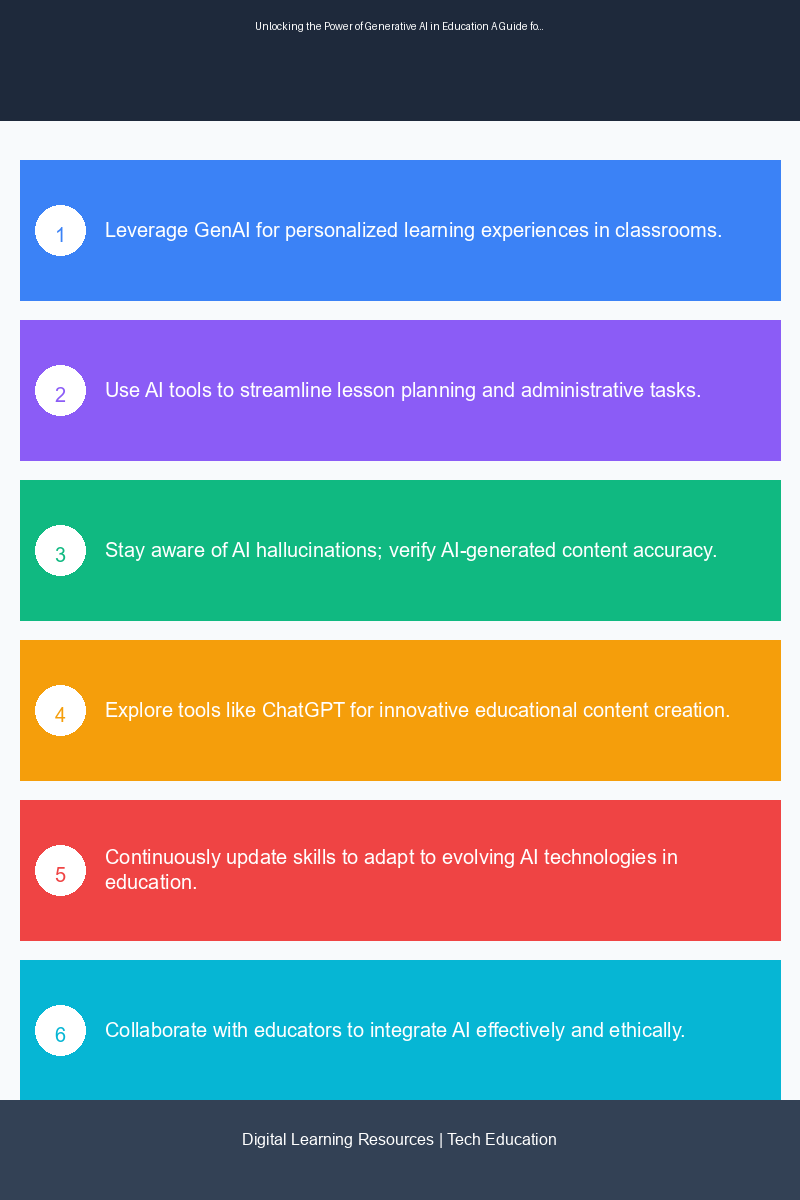Introduction: Key Takeaways
The rise of Generative Artificial Intelligence (GenAI) is revolutionizing educational landscapes, offering unprecedented opportunities for enhancing teaching methodologies and reducing teacher workload. In this blog post, we will explore the technical concepts and practical applications of AI tools in education, the latest industry trends, and actionable recommendations for professionals looking to integrate these technologies into their work. Whether you’re a developer, IT professional, or tech learner, this guide will equip you with the knowledge and skills necessary to thrive in this evolving landscape.
Technical Background and Context
Generative AI refers to algorithms that can create new content, including text, images, and videos, based on learned patterns from existing data. Tools like ChatGPT from OpenAI and Gemini have gained traction in educational environments, aiding teachers in lesson planning and content generation. However, this powerful technology also comes with challenges, notably the phenomenon of AI hallucination, where AI systems generate plausible-sounding but factually incorrect information.
Practical Applications and Use Cases
AI tools can significantly enhance educational content generation and lesson planning. Here are some practical applications:
📚 Recommended Digital Learning Resources
Take your skills to the next level with these curated digital products:
Academic Calculators Bundle: GPA, Scientific, Fraction & More
Academic Calculators Bundle: GPA, Scientific, Fraction & More
ACT Test (American College Testing) Prep Flashcards Bundle: Vocabulary, Math, Grammar, and Science
ACT Test (American College Testing) Prep Flashcards Bundle: Vocabulary, Math, Grammar, and Science
Leonardo.Ai API Mastery: Python Automation Guide (PDF + Code + HTML
Leonardo.Ai API Mastery: Python Automation Guide (PDF + Code + HTML
100 Python Projects eBook: Learn Coding (PDF Download)
100 Python Projects eBook: Learn Coding (PDF Download)
HSPT Vocabulary Flashcards: 1300+ Printable Study Cards + ANKI (PDF)
HSPT Vocabulary Flashcards: 1300+ Printable Study Cards + ANKI (PDF)
- Lesson Planning: AI tools can help teachers create lesson plans that are tailored to diverse learning needs, streamlining the preparation process.
- Content Generation: AI can assist in generating quizzes, assignments, and supplementary materials, enabling teachers to focus on instruction rather than administrative tasks.
- Personalized Learning: AI can analyze student performance and suggest personalized learning paths, enhancing student engagement and success.
Learning Path Recommendations
For educators and tech professionals interested in harnessing AI in education, consider the following learning paths:
- Digital Literacy: Build a solid foundation in digital tools and platforms, focusing on AI technologies.
- Professional Development: Participate in workshops or courses on using AI tools effectively in classroom settings.
- Critical Thinking Skills: Develop skills to evaluate AI-generated content critically, ensuring factual integrity and reliability.
Industry Impact and Career Implications
The integration of AI in education is not just a trend; it’s a profound shift that can reshape teaching and learning. Government initiatives, such as the formation of committees by the Gujarat government to assess AI adoption, highlight the growing recognition of AI’s potential. Major tech companies, including Google and Microsoft, are investing heavily in AI infrastructure in India, indicating strong market demand for professionals skilled in these technologies.
For tech professionals, this creates exciting career opportunities in educational technology, curriculum design, and AI development. As schools strive to integrate AI, there will be a need for experts who can guide and implement these changes effectively.
Implementation Tips and Best Practices
To successfully integrate AI tools into educational settings, consider the following best practices:
- Start Small: Implement one or two AI tools at a time to assess their effectiveness and gather feedback from both teachers and students.
- Provide Training: Invest in professional development for educators, ensuring they are comfortable and proficient in using AI tools.
- Monitor and Evaluate: Continuously monitor the effectiveness of AI tools and make necessary adjustments based on user feedback and educational outcomes.
- Stay Updated: Keep abreast of the latest developments in AI technology and educational methodologies to maintain a competitive edge.
Future Trends and Skill Requirements
As AI continues to evolve, here are some future trends and essential skills for tech professionals:
- Increased Collaboration: Expect more collaborative platforms that integrate AI tools for lesson planning and student engagement.
- Focus on Ethical AI: Professionals will need to understand the ethical implications of AI, including issues related to data privacy and misinformation.
- Interdisciplinary Skills: A blend of technical skills, pedagogical knowledge, and soft skills such as communication and teamwork will be critical.
Conclusion: Actionable Next Steps
Generative AI presents a tremendous opportunity for transforming education, but it requires a strategic approach. Here’s how you can get started:
- Explore AI Tools: Familiarize yourself with tools like ChatGPT and Gemini, and consider how they can be integrated into your educational practices.
- Invest in Training: Seek out professional development opportunities focused on AI in education.
- Join Communities: Connect with other educators and tech professionals to share insights, challenges, and solutions related to AI in education.
- Stay Engaged: Follow industry trends and participate in discussions around the ethical use of AI in education to stay informed and proactive.
By embracing the potential of Generative AI, educators and tech professionals can not only enhance their teaching methodologies but also contribute to a more efficient and engaging learning experience for students. Start your journey today to be at the forefront of this educational revolution!
Disclaimer: The information in this article has been gathered from various reputed sources in the public domain. While we strive for accuracy, readers are advised to verify information independently and consult with professionals for specific technical implementations.
Ready to advance your tech career? Explore our digital learning resources including programming guides, certification prep materials, and productivity tools designed by industry experts.

